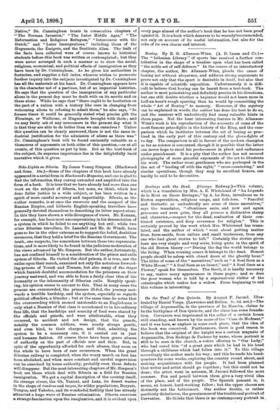Side - Lights on Siberia. By James Young Simpson. (Blackwood and Sons.
16s.)—Some of the chapters of this book have already appeared in a serial form in Blackwood's Magazine, and one is glad to find the information they convey extended and amplified into the form of a book. It is true that we have already had more than one work on the subject of Siberia, but none, we think, which has done fuller justice to a wide subject, or has been written in a spirit of more careful accuracy and impartiality. Siberia, as the author remarks, is at once the reservoir and the cesspool of the Russian Empire, and hitherto English-speaking travellers have generally devoted themselves to describing its latter aspect alone. In this they have shown a wide divergence of views. Mr. Kennan, for example, has been most uncompromising in his denunciation of a system in which he failed to see anything but evil ; while two other Siberian travellers, Dr. Lansdell and Mr. de Windt, have gone so far in the other extreme as to suggest the belief, doubtless erroneous, that they hold a brief for the Russian Government. The truth, one suspects, lies somewhere between these two representa- tions, and is more likely to be found in the judicious moderation of the views advanced by Mr. Simpson. But the author, fortunately, has not confined himself to a consideration of the prison and exile system of Siberia. He visited the chief prisons, it is true, saw the exiles upon their march, examined not only the notorious forward- ing-prisons of Tomsk and Tiumen, but also many of the stapes which furnish doubtful accommodation for the prisoners on their journey eastward, and was able to form a fairly clear idea of the humanity or the inhumanity of Siberian exile. Roughly speak- ing, his opinion seems to amount to this. That in many cases the prisons are overcrowded, the prisoners ill-fed, the journey east- wards a terrible hardship, and the system, especially as regards political offenders, a blunder ; but at the same time he notes that the overcrowding which seemed intolerable to an Englishman is only what a Russian of that class is accustomed to in his ordinary free life, that the hardships and scarcity of food were shared by the officials and guards, and were attributable, when they occurred, to accident and not design, that the guards, notably the common soldiers, were nearly always gentle, and even kind, to their charges, and that, admitting the system to be a necessary one, it is carried out in just and humane fashion. Of course there have been grave abuses of authority on the part of officials now and then. But, in spite of the opportunity afforded for such abuses, they seem on the whole to have been of rare occurrence. When the great Siberian railway is completed, when the weary march on foot has been abolished, and when more constant and careful supervision can be exercised by home authority, probably even these defects will disappear. But the most interesting chapters of Mr. Simpson's book are those which deal with Siberia as a field for Russian immigration. We get a capital description of the country itself, its strange rivers, the Ob, Yenisei, and Lena, its desert wastes in the shape of tundras and taigas, its wilder populations, Buryats, Tungus, and Yakutes, and its wonderful fertility that has already attracted a huge wave of Russian colonisation. Siberia exercises a strange fascination upon the imagination, and it is evident upon every page almost of the author's book that he has not been proof' against it. It is a book which deserves to be warmlylrecommended, not only on account of its useful information, but also for the sake of its own charm and interest.


































 Previous page
Previous page